The holidays are rapidly approaching, which means lots of parties and lots of food. And for many of us, lots of overeating. To help you prepare for the ailments that can occur from attending these parties, Historical Collections is highlighting advice from a recent book donation. The book, The Library of Health, published in 1920, was donated by Kathryn Lothschuetz Montgomery, retired associate professor and chair of the Department of Partnerships, Professional Education, and Practice at the School of Nursing. According to its extended title, the volume provides a “complete guide to prevention and cure of disease, containing practical information on anatomy, physiology and preventive medicine; curative medicine, first aid measures, diagnosis, nursing, sexology, simple home remedies, care of the teeth, occupational diseases, garden plant remedies, alcohol and narcotics, treatment by fifteen schools of medicine, beauty culture, physical culture the science of breathing and the dictionary of drugs.”
Below are some helpful definitions and treatment suggestions for common food ailments from the 1920 volume. We at the Historical Collections do not endorse trying any of these treatments:
Cramps in Stomach.—Make mustard poultice, with white of egg instead of water, and apply same to bowels, and give Squibbs’ Mixture. Hot water bags often afford relief. Paregoric and also laudanum relieve pain, but must be used with great caution.
Diarrhoea.—Take half ounce of blackberry root and boil in pint of water about fifteen minutes, strain and give teaspoonful every hour or two until relieved; or fluid extract, dose five to ten drops in a little water; one-half to one teaspoonful of paregoric in water.
Other remedies are:
1. An infusion of chamomile, prepared by steeping four to six heads of chamomile flowers in a cup of boiling water for an hour, and giving a teaspoonful hourly. Avoid solid food until bowels are all right.
2. Tablets of chalk mixture, of subnitrate of bismuth, or of pepsin; paregoric, laudanum.
3. Give starch injection with half a teaspoonful of laudanum for adult; for child only a few drops, and one drop of the wine of ipecac every hour, especially if vomiting be present, or half a grain of gray powder (mercury and chalk) every hour or two.
4. A good blackberry cordial, such as the following, is often found to be a preventive and specific for summer complaint, diarrhoea, etc.:
Ripe blackberries 2 quarts
Sugar, white 1 pound
Cloves and allspice 1/2 ounce of each
Boil all together. When cold, press out and strain the juice and add a pint of good brandy. This makes a pleasant drink, and may be taken in quantities from a teaspoonful to a wineglassful every two to four hours. Be careful not to take too much astringent medicine and thereby check the diarrhoea too suddenly.
Heartburn.—Give five drops of the tincture of nux vomica half an hour before each meal.
Indigestion.—An exclusive diet of fruit for several days is found efficacious in most cases of indigestion. This diet is excellent in dyspepsia and constipation.
Indigestion, Acute.—Dyspepsia, heartburn, a functional derangement of the stomach with pain, a sense of distension and gas, regurgitation of food, headache, and frequently perspiration. Regulation of the diet is of great importance, and for the acute symptoms bismuth 10 to 20 grains, essence of peppermint, one-half teaspoonful in water, bicarbonate of soda, and if pain is severe one or two teaspoonfuls of paregoric in hot water. The after treatment consist in keeping the bowels open and you may take the following:
Subnitrate of bismuth 2 1/2 drachms
Fluid Extract cascara 4 drachms
Compound tincture cardamom 6 drachms
Glycerine 4 drachms
Peppermint water 4 ounces
Sour Stomach—Heartburn.—Symptoms.—This common and distressing complaint results simply from undue acidity of the stomach caused by errors in diet or by dyspepsia. It produces a burning sensation in the stomach and under the breast-bone, often accompanied by nausea.
Treatment.—Take the following mixture, after meals, when the trouble occurs:
Baking soda ½ teaspoonful
Water ½ cupful
Sick Stomach.—Tablets of lime water; tablets of subnitrate of bis- muth; aromatic spirits of ammonia.
To read more from the 1920 volume, see the Library of Congress’ digitized version. Or stop into Historical Collections on the fifth floor of the HS/HSL to see the impressive volume for yourself!
Historical Collections wishes everyone a healthy and safe Holiday Season!


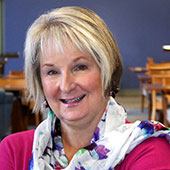















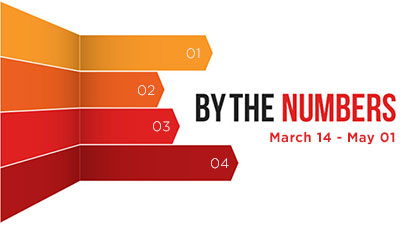

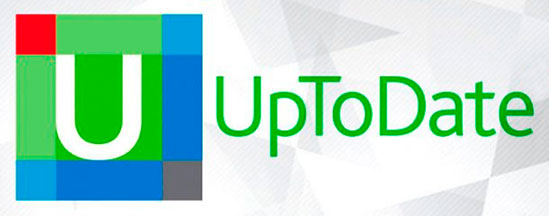





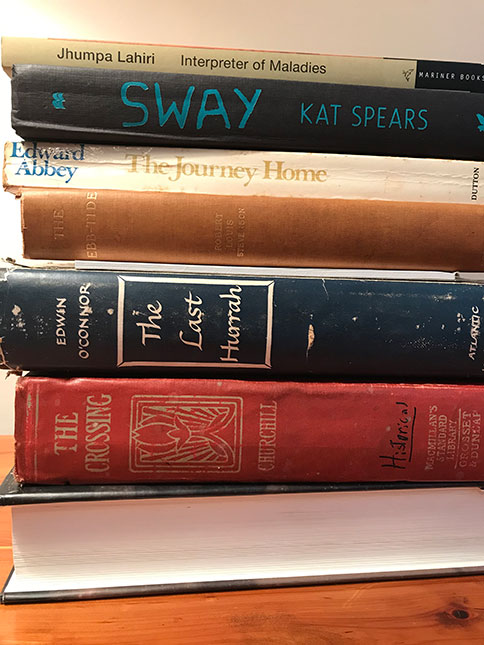

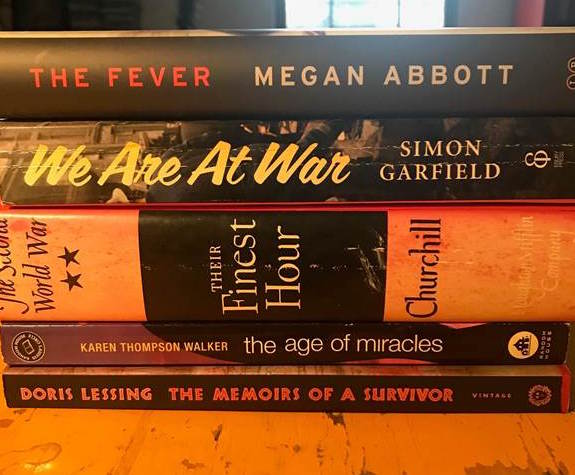
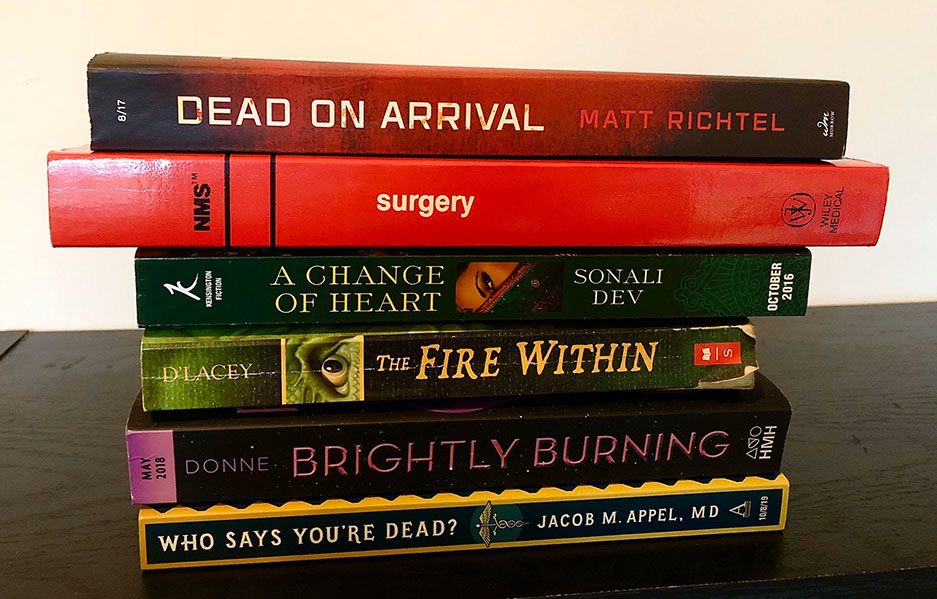

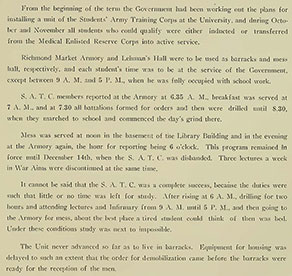
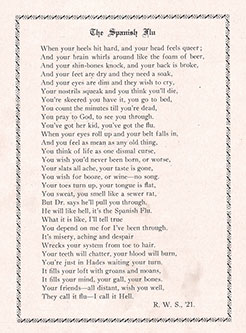








 We celebrated National Medical Librarians Month with a social media contest to award a $100 Visa gift card for the most creative entry. We appreciate all of those who contributed to #iheartumbhshsl, but there could only be one winner, and that was School of Dentistry (SOD) student Greg Poku-Dankwah. He submitted a snappy original song and dance video in homage to the Library. We cannot stop singing it! We asked Greg a few questions about his video.
We celebrated National Medical Librarians Month with a social media contest to award a $100 Visa gift card for the most creative entry. We appreciate all of those who contributed to #iheartumbhshsl, but there could only be one winner, and that was School of Dentistry (SOD) student Greg Poku-Dankwah. He submitted a snappy original song and dance video in homage to the Library. We cannot stop singing it! We asked Greg a few questions about his video.
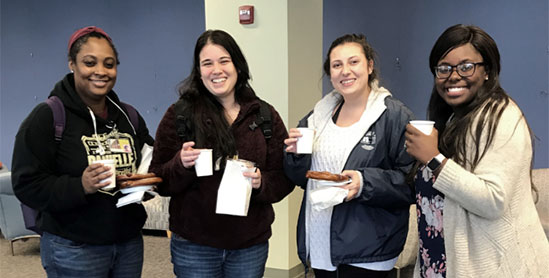
 We have exciting news to share about the Library’s second floor. Look for new carpet and paint on the north side of the second floor, new tables and chairs in the tower, large group tables and more banquettes in the open study area. All tables will have access to power. There will also be new carpet and different chairs in the second floor study rooms. Chairs are arriving in February!
We have exciting news to share about the Library’s second floor. Look for new carpet and paint on the north side of the second floor, new tables and chairs in the tower, large group tables and more banquettes in the open study area. All tables will have access to power. There will also be new carpet and different chairs in the second floor study rooms. Chairs are arriving in February! In spring 2020, the PubMed.gov database will transform into a modern hub with a fast, reliable, and intuitive search that connects people to the world’s leading sources of biomedical information. The new interface will continue to provide the search features you rely on and integrate enhanced navigation and display tools, including a built-in citation button, the ability to share articles via social media, and a responsive mobile experience.
In spring 2020, the PubMed.gov database will transform into a modern hub with a fast, reliable, and intuitive search that connects people to the world’s leading sources of biomedical information. The new interface will continue to provide the search features you rely on and integrate enhanced navigation and display tools, including a built-in citation button, the ability to share articles via social media, and a responsive mobile experience.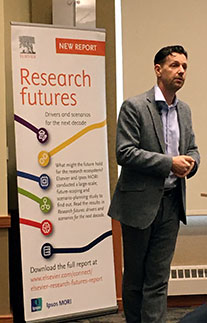
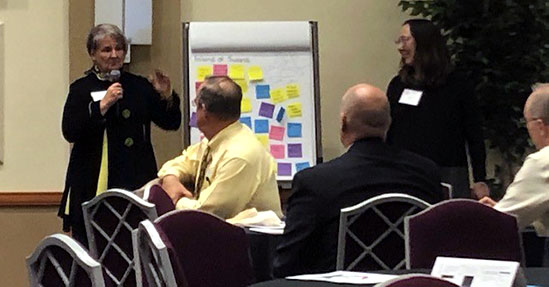
 Like last year, attendees appreciated having a convenient place to receive the flu shot on campus. The clinic also gave pharmacy students an opportunity to practice inoculating patients with guidance from faculty and professional pharmacists.
Like last year, attendees appreciated having a convenient place to receive the flu shot on campus. The clinic also gave pharmacy students an opportunity to practice inoculating patients with guidance from faculty and professional pharmacists. Building on the success of three past events, the National Network of Libraries of Medicine (NNLM) continued its efforts to improve consumer health information on Wikipedia with its fourth #citeNLM Edit-a-thon, held on November 20, 2019. Using trusted
Building on the success of three past events, the National Network of Libraries of Medicine (NNLM) continued its efforts to improve consumer health information on Wikipedia with its fourth #citeNLM Edit-a-thon, held on November 20, 2019. Using trusted  Earlier this year, students from Augusta Fells Savage Institute of Visual Art and their art instructor, Martin Goggins, visited the Weise Gallery as one of the stops on a campus walking tour led by Brian Sturdivant, director of UMB Strategic Initiatives and Community Partnerships. At the time, the Gallery was showing Nature’s Spring Sonata, an exhibit of paintings by Maryland first lady, Yumi Hogan.
Earlier this year, students from Augusta Fells Savage Institute of Visual Art and their art instructor, Martin Goggins, visited the Weise Gallery as one of the stops on a campus walking tour led by Brian Sturdivant, director of UMB Strategic Initiatives and Community Partnerships. At the time, the Gallery was showing Nature’s Spring Sonata, an exhibit of paintings by Maryland first lady, Yumi Hogan. Final exams are a stressful time! HS/HSL offers students the opportunity to take a short study break by collectively working a on a 1000-piece puzzle. The puzzle is available in the Innovation Space on the Library’s first floor, near the main elevators.
Final exams are a stressful time! HS/HSL offers students the opportunity to take a short study break by collectively working a on a 1000-piece puzzle. The puzzle is available in the Innovation Space on the Library’s first floor, near the main elevators.
 As of 2019, if you add up all the years of professional service of the 26 librarians currently on staff, the total comes to almost a half millennium of expertise—449 years, to be exact!
As of 2019, if you add up all the years of professional service of the 26 librarians currently on staff, the total comes to almost a half millennium of expertise—449 years, to be exact!